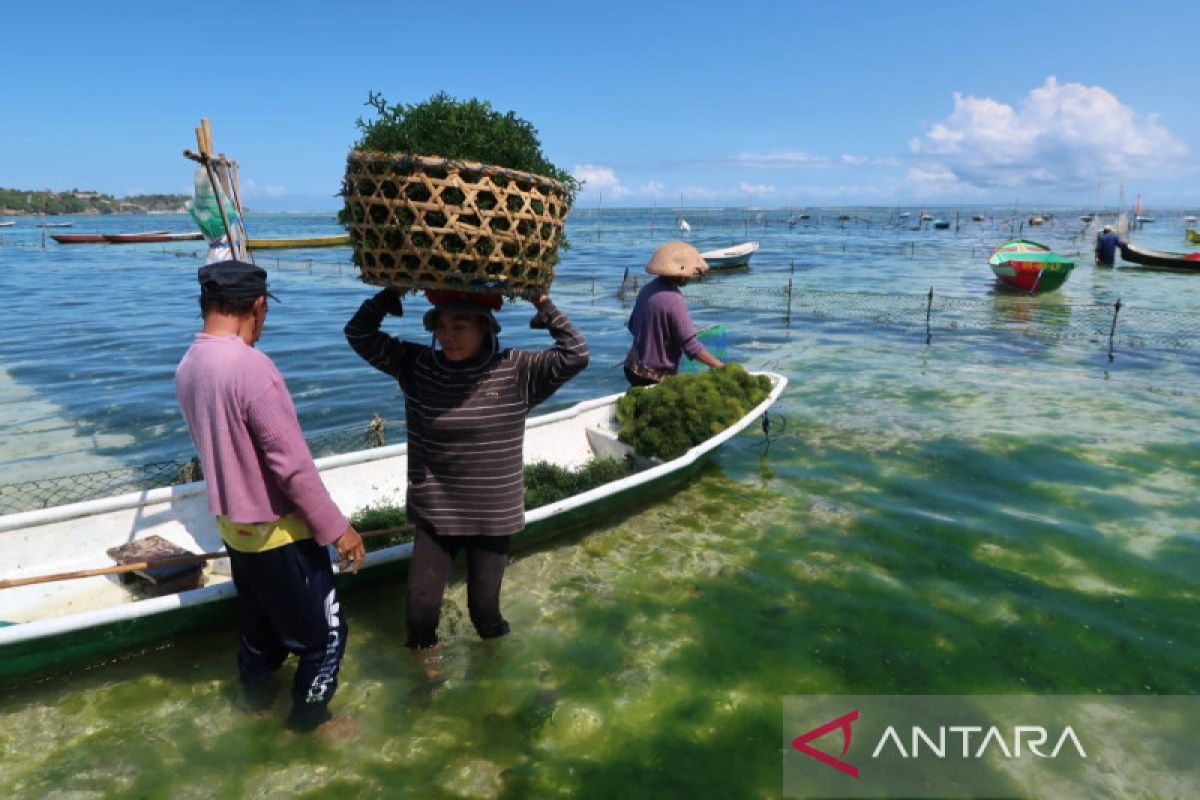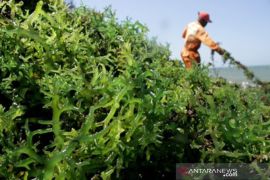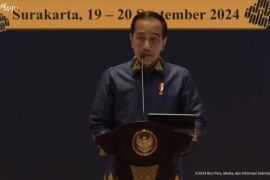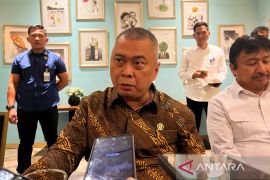A couple was seen pulling a boat containing two large baskets of seaweed to the shore.
They were Meta (59) and Armiti (58), who work as teachers but cultivate seaweed on the side to maintain the historical value of Lembongan Island as a seaweed-producing area.
The island became famous as a seaweed resource area four decades ago.
Seaweed began to be planted on Lembongan Island in 1982 and started growing rapidly in 1985.
The popularity of seaweed cultivation in the region lasted three decades, with farmers slowly abandoning it and turning to the tourism sector, especially between 2008 and 2019.
"When COVID-19 suspended the tourism sector, people returned to seaweed farming, which continues until now," Armiti told ANTARA while harvesting seaweed.
Initially, red seaweed was the mainstay product of Lembongan Island, but now it can no longer be grown there due to climate change. At present, the more adaptive green seaweed has become more popular, Armiti informed.
Farmers only need to wait for a month to harvest the green seaweed called gerandong by locals.
Meta and Armiti have 500 green seaweed sticks, which can produce up to 3 sacks of dried seaweed every month.
Collectors buy dried seaweed at Rp15 thousand (US$1) per kilogram (kg), while wet seaweed is priced at Rp5 thousand (US$0.33) per kg.
In April 2023, the price of dried seaweed reached Rp40 thousand (US$2.66) per kg, the best price that seaweed farmers have recorded.
When the tourism sector started to move again after the COVID-19 pandemic, hundreds of residents did not abandon seaweed cultivation.
The tourism sector no longer influenced them to move away from greening the sea. Moreover, emerging home-based industries producing seaweed-based products also increased the demand for seaweed as raw material.
Seaweed organic soap
Coastal communities believe that the source of beauty comes from the sea. This belief inspired couple I Nyoman Sudiatmika and Ni Luh Putu Wira Astuti to create organic hand soap made from seaweed under their brand "Nusa."
Astuti and her husband started their home-based business during the COVID-19 pandemic.
In building their business, they said they are eager to absorb seaweed production and improve the living standards of seaweed farmers on Lembongan Island.
They use 5 kilograms of dried seaweed to make 25 liters of liquid hand soap, which is then packaged into bottles measuring 35 ml to 450 ml.
A 35 ml bottle of the hand soap is priced at Rp35 thousand (US$2.33), while a 450 ml bottle costs Rp110 thousand (US$7.31).
The couple makes a turnover of around Rp25 million (US$1,662) every month from selling seaweed-based hand soap through souvenir outlets in Bali.
Currently, they are developing other seaweed derivative products, ranging from bath soap, lotion, skin care products, serum, moisturizer, and sunscreen.
Seaweed derivative products are driving the economy of coastal communities, ensuring they need no longer rely on the tourism or fisheries sectors alone.
Underwater tourism
Two young men sat on the wave breakers, soaked to the bone. They had just returned from taking some coral reefs to grow in the waters of Nusa Penida Island, Klungkung, Bali.
They broke the coral reefs and stored them in plastic boxes filled with seawater.
Under the auspices of the Nuansa Pulau Group, which was established in 2020, they are helping resurrect damaged coral reefs to conserve the marine ecosystem.
The group has received funding support from non-profit organization Indonesia Climate Change Trust Fund (ICCTF).
I Gusti Ngurah Gede Hartawan (23), a member of the Nuansa Pulau Group, has sunk 200 reef stars, measuring 50 cm in diameter, 2 to 5 meters underwater.
The reef stars became a place for the attachment and development of 3,000 coral fragments in the completion project.
The Nuansa Pulau group, which currently has 30 members, was formed by students who found themselves unemployed because of the struggling tourism sector.
In addition to restoring coral reefs, they also offer snorkeling tours for Rp100 thousand (US$6.65) per pax.
The snorkeling package includes a guide who takes tourists to explore coral reef gardens and observe various types of fish that swim among coral reefs.
According to a study by the National Development Planning Agency (Bappenas), each hectare of good coral reefs can provide an economic value of Rp17 billion (US$1.1 million) per year.
Coral reefs can provide economic value due to their function as centers of marine biodiversity, fishing spots for both consumption and ornamental purposes, sources of pharmaceutical raw materials, and tourist attractions.
Indonesia has a protected marine area of 28 million hectares, which covers 12 percent of the total maritime area of the country.
The government is seeking to increase the percentage of protected marine areas to 30 percent by 2045.
For Hartawan and 29 other young people in the Nuansa Pulau Group, the sea is not just a place to find food, but one that can make a big contribution to the future of the Earth.
If seawater temperatures continue to increase due to global warming, coral reefs will be damaged, leaving marine life homeless. This could exacerbate the impact of a food crisis.
Therefore, ecological coral reef restoration is an effort to maintain marine ecosystems so that marine life have homes and can continue to breed.
Coastal ecosystems, in the form of mangroves, seagrasses, and coral reefs, can absorb very large amounts of carbon.
The Nusa Penida community’s activities to preserve coral reefs have shown that community involvement in government programs is very important, as seen in the community of Nusa Lembongan who were able to get out of the crisis caused by tourism restrictions.
Related news: Govt to start pilot project of seaweed farming in Wakatobi this year
Related news: Indonesia invites South Korean investment in seaweed cultivation
Translator: Sugiharto P, Kenzu
Editor: Tia Mutiasari
Copyright © ANTARA 2023












